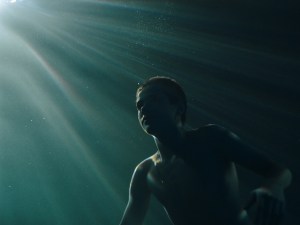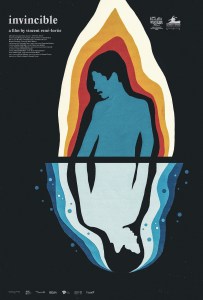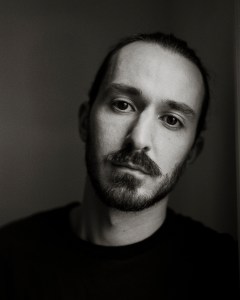Canadian director Vincent René-Lortie’s film Invincible tells the story of the last 48-hours of a 14-year old boy’s life as he grapples with self-destructive impulses while still yearning for his freedom from mental health struggles. Shortlisted for the Oscars in the Live Action Short Film category, the film is inspired by true events involving René-Lortie’s childhood friend, Marc-Antoine Bernier.
Winner of the International Special Jury Prize at the 2023 Clermont-Ferrand International Short Film Festival, Invincible draws the viewer into the emotional state and conflicted mind of Bernier. It’s the debut film from René-Lortie, a graduate of Montreal’s Mel Hoppenheim School of Cinema at Concordia University.
DEADLINE: Invincible is your debut narrative film which is inspired by real events from an incident you experienced. Why did you decide on this story to be the first showcase of your work?
Director Vincent René-Lortie
Courtesy of Fred Gervais
Vincent René-Lortie: I was just coming out of university when I started working on this film. I had a few project ideas in mind that I wanted to develop, but for some reason, Marc’s [Antoine Bernier] story was deeply ingrained in my memory. Before deciding to make a film about him, I reached out to his family. At the time, I believed that the death of my childhood friend was the result of an accident. One winter evening, I went for coffee with his father, and I vividly recall that conversation. One of the first things he told me was that, in his eyes, [Bernier’s death] might have been a suicide. I was completely taken aback by this information. I realized that I probably knew very little about my friend.
From that moment onward, I delved into extensive research, partly to get closer to him, but also to understand better what had happened. Eventually, the desire to make a film became clear to me. There was something in this story that I was burning to tell.
DEADLINE: The film has distinct visual pieces that feel deeply personal and stay with the viewer long after the film is over. Can you describe your process of creating the balance between the technical and creative elements to effectively communicate your story?

‘Invincible’
Courtesy of Alexandre Nour
VRL: Firstly, thank you for saying that; it truly means a lot to me. The visual aspect has always been incredibly important to me, not because I aim for aesthetically pleasing images, but because I strongly believe in the saying that a picture is worth a thousand words. I worked diligently on the visual style with my director of photography, Alexandre Nour, and my art director, Geneviève Boiteau, to create a film that reflected the essence of my friend. I wanted to see the world through his eyes. That’s why a significant portion of the film is shot with stability and close-ups. In addition to the 4:3 aspect ratio, this compelled Léokim Beaubier-Lépine [the actor portraying Marc] to remain within a frame that was almost suffocating at times for the viewer and, indeed, for him as well. It created a profoundly claustrophobic prison-like effect.
All the colors in the film were also chosen to align with his emotions. The film remains predominantly dark throughout, except when Marc is outdoors. This is precisely why we concluded the film with warm colors. For me, it was crucial to understand that even in this tragic ending, something was comforting. Marc was finally free, and that, ultimately, was all he ever wanted.
DEADLINE: What did you discover in researching childhood trauma and how it impacts the mental health of adolescents into adulthood?
VRL: I believe that mental health is something that is often downplayed in young children and teenagers. The conversation around mental health has evolved significantly in the adult world in recent years. However, it’s all too easy to dismiss depression in a child as a passing phase that will resolve itself with maturity. We can imagine how this mindset can have a profoundly detrimental impact on the journeys and development of these young individuals into adulthood.
Another discovery I made through this research is that delinquency among adolescents is often a sign of depression. This depression may manifest in ways that society perceives as being a “bad child.” Yet, in reality, it’s often a cry for help and a way of expressing that they need assistance and listening.
DEADLINE: What were the challenges that you faced during the different stages of making the film?

Courtesy of Caspar Newbolt
VRL: There were numerous challenges. To give you an idea, I began the research over five years ago. It was a long, at times difficult, but above all, a beautiful journey. I aimed to stay true to the story in as many ways as possible. For instance, I wanted to shoot in a real juvenile center, with mostly non-professional young actors. It wasn’t easy, but I believe the most significant challenge was taking this true story and transforming it into a film – finding and choosing what mattered most in this narrative. For me, it was that Marc’s worst enemy was himself, and that’s what I wanted to convey through this film, depicting the character’s struggle with mental health. However, this is no easy feat in a film, especially a short one.
I continuously revised the script in the three years leading up to the shoot and during editing. Ultimately, amid all these challenges, what I wanted most was to remain faithful to the real Marc, his energy, and his character. Much of this is thanks to the first-time actor, Léokim Beaubier-Lépine, who carries the film on his shoulders for 30 minutes and, in my opinion, managed to portray Marc with incredible sensitivity and understanding.
DEADLINE: Invincible has been shortlisted in the Live Action Short Film category, putting it in contention for a 2024 Oscar nomination. What does this recognition mean to you?
VRL: It’s completely surreal. We made this film alongside friends, with little experience but a lot of love. I was so far from even dreaming that this film would one day be considered for an Oscar. I am honored and deeply touched by the love the film has received before and since this announcement. We grow up watching the great artists of cinema climb onto that stage and receive that iconic award. The Oscars mark the history of cinema every year, and they have done so for so long. It’s a bit of a childhood dream that I’m living right now.
And whether there will be a nomination or not, I feel so fortunate to have come this far. It ensures that a broader audience watches the film. Many people have come to talk to me about the film, sharing their experiences of knowing someone like Marc or, at times, having been him. And that’s ultimately why we make movies – to share a story that is dear to us but also to connect with the audience, make them reflect, and engage in important conversations.
Note: Invincible is available to view for free on Omeleto’s YouTube channel, except in Europe, where the film can be seen on ARTE.

